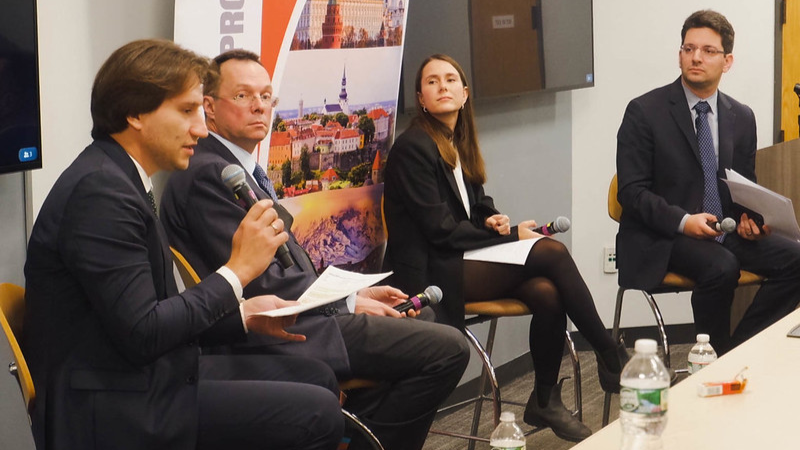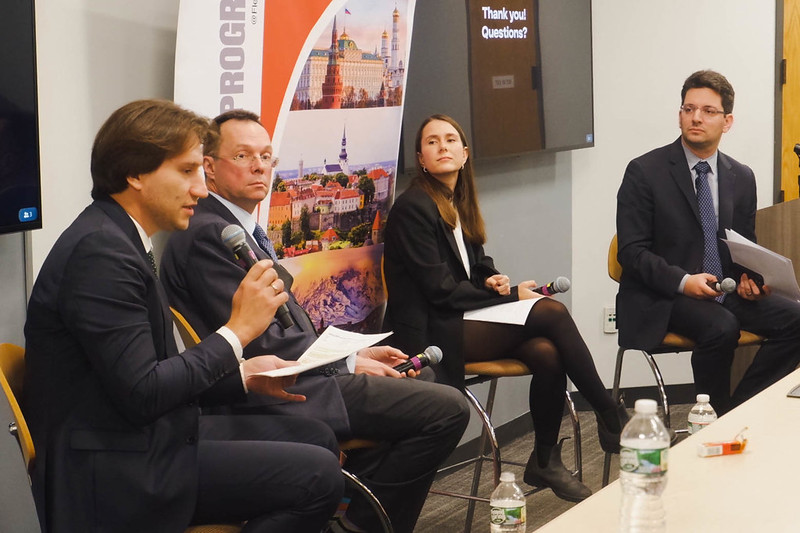
Russia’s Foreign Agents Law and the Crackdown on Anti-Government Expression
By Alex Avaneszadeh, Project Manager, Fletcher Russia and Eurasia Program
On November 2, 2023, the Fletcher Russia and Eurasia Program held a two-part event on the impact of Russia’s foreign agents law on the work and lives of activists and independent lawyers. The event began with a conversation on the effect of the foreign agents law on Russia’s judiciary, which was spoken to by former Fletcher visiting scholar and human rights lawyer Maxim Krupskiy. The latter talk, supported by The Moscow Times, involved Krupskiy as a discussant alongside famed Russian independent journalists Olga Churakova and Sonya Grosyman, creators of the notable “Hi, You’re a Foreign Agent” podcast. Churakova and Groysman conveyed how being labeled as foreign agents themselves affected their lives, with both having left Russia to avoid further scrutiny and crackdown on their journalistic activities.
Russia’s foreign agents law came into effect in 2012. At the time, the law was primarily used to target civil society; however, since then, this law has developed to target a wider array of voices, including lawyers, independent activists, political opposition, and journalists. Now, hundreds of these entities have been added to the register of foreign agents, indicative of the government’s attempt to silence criticism toward the state and establish a monopoly on information.
“The persecution of defense lawyers has been developing for many years and is now on a new scale against the backdrop of the war in Ukraine,” said Krupskiy, as the practice of labeling lawyers as foreign agents has become a form of punishment for being disloyal to Putin’s regime. This applies to the actions of lawyers defending political opposition and being vocal against government policies.
Having mentioned the difficulties of working in the context of a repressive state and an indifferent bar association of lawyers, being an attorney labeled as a foreign agent “creates obstacles for work, as potential clients could see it as negatively influencing their case in the eyes of a judge,” highlighted Krupskiy.
Churakova, in describing her circumstances, said that “in 2018, I wrote an article about the Russian government tightening foreign agents legislation; and in 2021, I became a foreign agent myself. We had to include a disclaimer in our social media posts that we are spies, do not deserve trust, and that we are state enemies. We had a choice to leave in 2021, and most people on the foreign agents list almost immediately left the country to avoid jail time for not writing the disclaimer and reports of their activities.”
After Churakova and Groysman found themselves and their journalistic work impacted by the foreign agents law and their exile from Russia, they faced the challenge of how to continue their activities. The answer was the creation of their podcast “Hi, You’re a Foreign Agent.”
“After becoming a foreign agent, Olga and I decided to make a podcast. We did not know what it meant to be a foreign agent and what all this meant even to ourselves as journalists,” highlighted Groysman. As such, podcasts became an effective medium for their work because “in exile we can do large scale journalism in that format and is one of the few mediums that is not yet controlled by Russian authorities. Our team is scattered.”
Groysman and Churakova expressed that it was initially unclear as to what it meant to be a foreign agent. Nevertheless, the start of their podcast was an adaptation to their predicament. The podcast attempted to give Russian dissidents a voice and to tell the stories of those affected by the war and their domestic situation.
“We decided to shift our focus to people in Russia who resist the war to give them a voice. Russians protest, but their voices are not as loud as everyone prefers. We tried to make sense of the situation and be helpful, and I am proud that with our podcast, we helped fundraise thousands of dollars for Ukrainian refugees through leaving donation links in our episodes,” said Groysman.
With the popularity of their podcast on the rise, Groysman and Churakova described it as giving them a new sense of purpose. As Groysman noted, “there is therapy in journalism. No matter what Russian propaganda says, you are not alone.”

